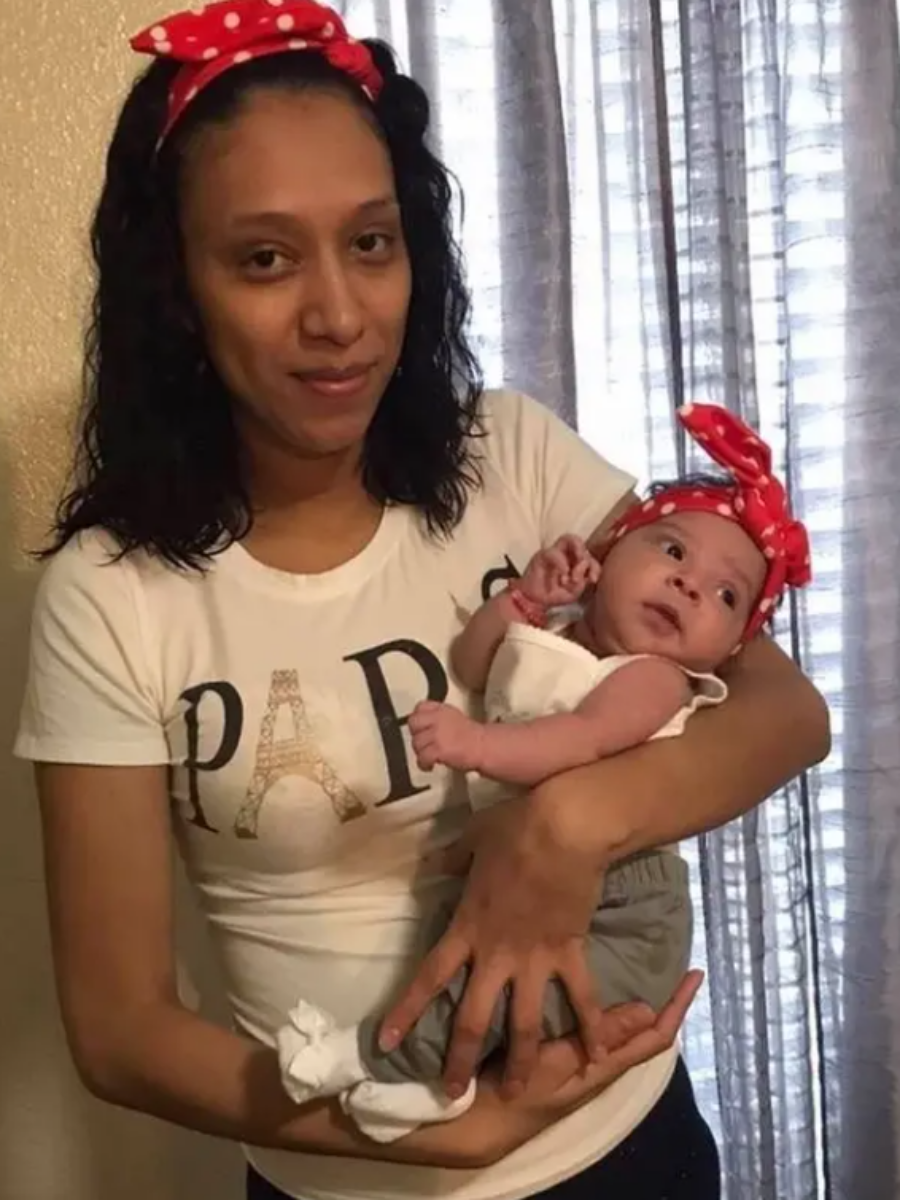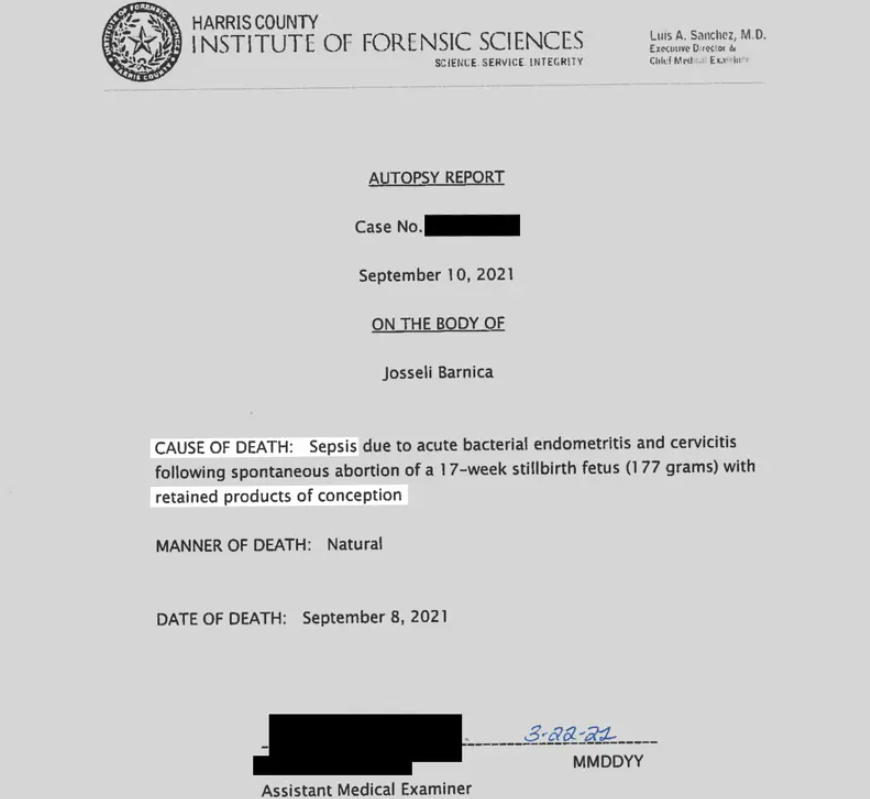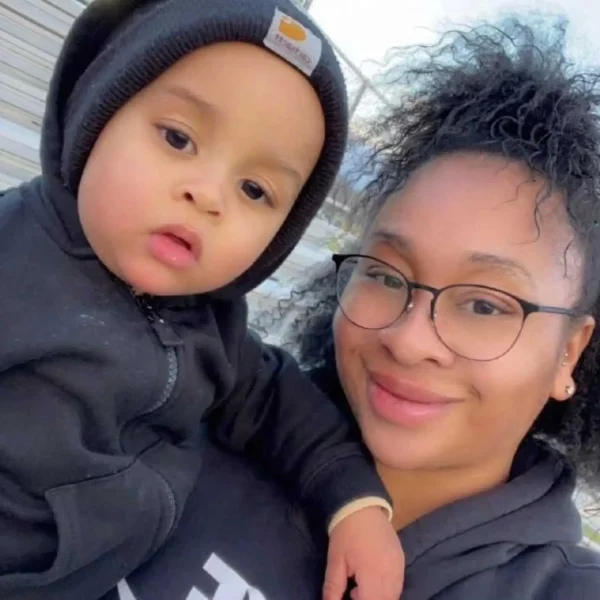
A Woman Died After Being Told It Would Be a “Crime” to Intervene in Her Miscarriage at a Texas Hospital
Synopsis
Josseli Barnica is one of at least two pregnant Texas women who died after doctors delayed emergency care. She’d told her husband that the medical team said it couldn’t act until the fetal heartbeat stopped.
Josseli Barnica grieved the news as she lay in a Houston hospital bed on Sept. 3, 2021: The sibling she’d dreamt of giving her daughter would not survive this pregnancy.
The fetus was on the verge of coming out, its head pressed against her dilated cervix; she was 17 weeks pregnant and a miscarriage was “in progress,” doctors noted in hospital records. At that point, they should have offered to speed up the delivery or empty her uterus to stave off a deadly infection, more than a dozen medical experts told ProPublica.
But when Barnica’s husband rushed to her side from his job on a construction site, she relayed what she said the medical team had told her: “They had to wait until there was no heartbeat,” he told ProPublica in Spanish. “It would be a crime to give her an abortion.”
For 40 hours, the anguished 28-year-old mother prayed for doctors to help her get home to her daughter; all the while, her uterus remained exposed to bacteria.
Three days after she delivered, Barnica died of an infection.
Barnica is one of at least two Texas women who ProPublica found lost their lives after doctors delayed treating miscarriages, which fall into a gray area under the state’s strict abortion laws that prohibit doctors from ending the heartbeat of a fetus.
Neither had wanted an abortion, but that didn’t matter. Though proponents insist that the laws protect both the life of the fetus and the person carrying it, in practice, doctors have hesitated to provide care under threat of prosecution, prison time and professional ruin.
ProPublica is telling these women’s stories this week, starting with Barnica’s. Her death was “preventable,” according to more than a dozen medical experts who reviewed a summary of her hospital and autopsy records at ProPublica’s request; they called her case “horrific,” “astounding” and “egregious.”
The doctors involved in Barnica’s care at HCA Houston Healthcare Northwest did not respond to multiple requests for comment on her case. In a statement, HCA Healthcare said “our responsibility is to be in compliance with applicable state and federal laws and regulations” and said that physicians exercise their independent judgment. The company did not respond to a detailed list of questions about Barnica’s care.
Like all states, Texas has a committee of maternal health experts who review such deaths to recommend ways to prevent them, but the committee’s reports on individual cases are not public and members said they have not finished examining cases from 2021, the year Barnica died.
ProPublica is working to fill gaps in knowledge about the consequences of abortion bans. Reporters scoured death data, flagging Barnica’s case for its concerning cause of death: “sepsis” involving “products of conception.” We tracked down her family, obtained autopsy and hospital records and enlisted a range of experts to review a summary of her care that ProPublica created in consultation with two doctors.

Among those experts were more than a dozen OB-GYNs and maternal-fetal medicine specialists from across the country, including researchers at prestigious institutions, doctors who regularly handle miscarriages and experts who have served on state maternal mortality review committees or held posts at national professional medical organizations.
After reviewing the four-page summary, which included the timeline of care noted in hospital records, all agreed that requiring Barnica to wait to deliver until after there was no detectable fetal heartbeat violated professional medical standards because it could allow time for an aggressive infection to take hold. They said there was a good chance she would have survived if she was offered an intervention earlier.
“If this was Massachusetts or Ohio, she would have had that delivery within a couple hours,” said Dr. Susan Mann, a national patient safety expert in obstetric care who teaches at Harvard University.
Many noted a striking similarity to the case of Savita Halappavanar, a 31-year-old woman who died of septic shock in 2012 after providers in Ireland refused to empty her uterus while she was miscarrying at 17 weeks. When she begged for care, a midwife told her, “This is a Catholic country.” The resulting investigation and public outcry galvanized the country to change its strict ban on abortion.
But in the wake of deaths related to abortion access in the United States, leaders who support restricting the right have not called for any reforms.
Last month, ProPublica told the stories of two Georgia women, Amber Thurman and Candi Miller, whose deaths were deemed “preventable” by the state’s maternal mortality review committee after they were unable to access legal abortions and timely medical care amid an abortion ban.
Georgia Gov. Brian Kemp called the reporting “fear mongering.” Former President Donald Trump has not weighed in — except to joke that his Fox News town hall on women’s issues would get “better ratings” than a press call where Thurman’s family spoke about their pain.
Leaders in Texas, which has the nation’s oldest abortion ban, have witnessed the consequences of such restrictions longer than those in any other state.
In lawsuits, court petitions and news stories, dozens of women have said they faced dangers when they were denied abortions starting in 2021. One suffered sepsis like Barnica, but survived after three days in intensive care. She lost part of her fallopian tube. Lawmakers have made small concessions to clarify two exceptions for medical emergencies, but even in those cases, doctors risk up to 99 years in prison and fines of $100,000; they can argue in court that their actions were not a crime, much like defendants can claim self-defense after being charged with murder.
Amid the deluge of evidence of the harm, including research suggesting Texas’ legislation has increased infant and maternal deaths, some of the ban’s most prominent supporters have muted their public enthusiasm for it. U.S. Sen. Ted Cruz, who once championed the fall of Roe v. Wade and said, “Pregnancy is not a life-threatening illness,” is now avoiding the topic amid a battle to keep his seat. And Gov. Greg Abbott, who said early last year that “we promised we would protect the life of every child with a heartbeat, and we did,” has not made similar statements since.
Both declined to comment to ProPublica, as did state Attorney General Ken Paxton, whose commitment to the ban remains steadfast as he fights for access to the out-of-state medical records of women who travel for abortions. Earlier this month, as the nation grappled with the first reported, preventable deaths related to abortion access, Paxton celebrated a decision by the U.S. Supreme Court that allowed Texas to ignore federal guidance requiring doctors to provide abortions that are needed to stabilize emergency patients.
“This is a major victory,” Paxton said.
“They Had to Wait Until There Was No Heartbeat”
To Barnica, an immigrant from Honduras, the American dream seemed within reach in her corner of Houston, a neighborhood filled with restaurants selling El Salvadoran pupusas and bakeries specializing in Mexican conchas. She found work installing drywall, saved money to support her mother back home and met her husband in 2019 at a community soccer game.
A year later, they welcomed a big-eyed baby girl whose every milestone they celebrated. “God bless my family,” Barnica wrote on social media, alongside a photo of the trio in matching red-and-black plaid. “Our first Christmas with our Princess. I love them.”

Barnica longed for a large family and was thrilled when she conceived again in 2021.
Trouble struck in the second trimester.
On Sept. 2, 2021, at 17 weeks and four days pregnant, she went to the hospital with cramps, according to her records. The next day, when the bleeding worsened, she returned. Within two hours of her arrival on Sept. 3, an ultrasound confirmed “bulging membranes in the vagina with the fetal head in the open cervix,” dilated at 8.9 cm, and that she had low amniotic fluid. The miscarriage was “in progress,” the radiologist wrote.
When Barnica’s husband arrived, she told him doctors couldn’t intervene until there was no heartbeat.
The next day, Dr. Shirley Lima, an OB on duty, diagnosed an “inevitable” miscarriage.
In Barnica’s chart, she noted that the fetal heartbeat was detected and wrote that she was providing Barnica with pain medication and “emotional support.”
In a state that hadn’t banned abortion, Barnica could have immediately been offered the options that major medical organizations, including international ones, say is the standard of evidence-based care: speeding up labor with medication or a dilation and evacuation procedure to empty the uterus.
“We know that the sooner you intervene in these situations, the better outcomes are,” said Dr. Steven Porter, an OB-GYN in Cleveland.
But Texas’ new abortion ban had just gone into effect. It required physicians to confirm the absence of a fetal heartbeat before intervening unless there was a “medical emergency,” which the law did not define. It required doctors to make written notes on the patient’s condition and the reason abortion was necessary.
The law did not account for the possibility of a future emergency, one that could develop in hours or days without intervention, doctors told ProPublica.
Barnica was technically still stable. But lying in the hospital with her cervix open wider than a baseball left her uterus exposed to bacteria and placed her at high risk of developing sepsis, experts told ProPublica. Infections can move fast and be hard to control once they take hold.
The scenario felt all too familiar for Dr. Leilah Zahedi-Spung, a maternal-fetal medicine specialist who used to work in Tennessee and reviewed a summary of Barnica’s records at ProPublica’s request.
Abortion bans put doctors in an impossible position, she said, forcing them to decide whether to risk malpractice or a felony charge. After her state enacted one of the strictest bans in the country, she also waited to offer interventions in cases like Barnica’s until the fetal heartbeat stopped or patients showed signs of infection, praying every time that nothing would go wrong. It’s why she ultimately moved to Colorado.
The doctors treating Barnica “absolutely didn’t do the right thing,” she said. But she understood why they would have felt “totally stuck,” especially if they worked at a hospital that hadn’t promised to defend them.
Even three years after Barnica’s death, HCA Healthcare, the hospital chain that treated Barnica, will not disclose whether it has a policy on how to treat miscarriages.
Some HCA shareholders have asked the company to prepare a report on the risks to the company related to the bans in states that restrict abortion, so patients would understand what services they could expect and doctors would know under what circumstances they would be protected. But the board of directors opposed the proposal, partly because it would create an “unnecessary expense and burdens with limited benefits to our stockholders.” The proposal was supported by 8% of shareholders who voted.
The company’s decision to abstain has repercussions far beyond Texas; the nation’s largest for-profit hospital chain has said it delivers more babies than any other health care provider in America, and 70% of its hospitals are in states where abortion is restricted.
As the hours passed in the Houston hospital, Barnica couldn’t find relief. On the phone with her aunt Rosa Elda Calix Barnica, she complained that doctors kept performing ultrasounds to check the fetal heartbeat but were not helping her end the miscarriage.
Around 4 a.m. on Sept. 5, 40 hours after Barnica had arrived, doctors could no longer detect any heart activity. Soon after, Lima delivered Barnica’s fetus, giving her medication to help speed up the labor.
Dr. Joel Ross, the OB-GYN who oversaw her care, discharged her after about eight more hours.
The bleeding continued, but when Barnica called the hospital, she was told that was expected. Her aunt grew alarmed two days later when the bleeding grew heavier.
Go back, she told her niece.
On the evening of Sept. 7, Barnica’s husband rushed her to the hospital as soon as he got off from work. But COVID-19 protocols meant only one visitor could be in the room with her, and they didn’t have a babysitter for their 1-year-old daughter.
So he left and tried to get some sleep.
“I fully expected her to come home,” he said.
But she never did. Her family planned two funerals, one in Houston and another in Honduras.
Nine days after her death, Barnica’s husband was processing his shock, learning how to be a single dad and struggling to raise funds to bury his wife and the son he had hoped to raise.
Meanwhile, Lima was pulling up Barnica’s medical chart to make an addition to her records.
The notes she added made one point abundantly clear: “When I was called for delivery,” she wrote, “the fetus no longer had detectable heart tones.”
“They Should Vote With Their Feet”
Texas has been on the forefront of fighting abortion access.
At the time of Barnica’s miscarriage in 2021, the Supreme Court had not yet overturned the constitutional right to terminate a pregnancy. But Texas lawmakers, intent on being the first to enact a ban with teeth, had already passed a harsh civil law using a novel legal strategy that circumvented Roe v. Wade: It prohibited doctors from performing an abortion after six weeks by giving members of the public incentives to sue doctors for $10,000 judgments. The bounty also applied to anyone who “aided and abetted” an abortion.
A year later, after the Dobbs v. Jackson ruling was handed down, an even stricter criminal law went into effect, threatening doctors with up to 99 years in prison and $100,000 in fines.
Soon after the ruling, the Biden administration issued federal guidance reminding doctors in hospital emergency rooms they have a duty to treat pregnant patients who need to be stabilized, including by providing abortions for miscarriages.
Texas Attorney General Ken Paxton fought against that, arguing that following the guidance would force doctors to “commit crimes” under state law and make every hospital a “walk-in abortion clinic.” When a Dallas woman asked a court for approval to end her pregnancy because her fetus was not viable and she faced health risks if she carried it to term, Paxton fought to keep her pregnant. He argued her doctor hadn’t proved it was an emergency and threatened to prosecute anyone who helped her. “Nothing can restore the unborn child’s life that will be lost as a result,” he wrote to the court.
No doctor in Texas, or the 20 other states that criminalize abortion, has been prosecuted for violating a state ban. But the possibility looms over their every decision, dozens of doctors in those states told ProPublica, forcing them to consider their own legal risks as they navigate their patient’s health emergencies. The lack of clarity has resulted in many patients being denied care.
In 2023, Texas lawmakers made a small concession to the outcry over the uncertainty the ban was creating in hospitals. They created a new exception for ectopic pregnancies, a potentially fatal condition where the embryo attaches outside the uterine cavity, and for cases where a patient’s membranes rupture prematurely before viability, which introduces a high risk of infection. Doctors can still face prosecution, but are allowed to make the case to a judge or jury that their actions were protected, not unlike self-defense arguments after homicides. Barnica’s condition would not have clearly fit this exception.
This year, after being directed to do so by the state Supreme Court, the Texas Medical Board released new guidance telling doctors that an emergency didn’t need to be “imminent” in order to intervene and advising them to provide extra documentation regarding risks.
But in a recent interview, the board’s president, Dr. Sherif Zaafran, acknowledged that these efforts only go so far and the group has no power over criminal law: “There’s nothing we can do to stop a prosecutor from filing charges against the physicians.”
Asked what he would tell Texas patients who are miscarrying and unable to get treatment, he said they should get a second opinion: “They should vote with their feet and go and seek guidance from somebody else.”
An immigrant from El Salvador who works 12-hour shifts, Barnica’s husband doesn’t follow American politics or the news. He had no inkling of the contentious national debate over how abortion bans are affecting maternal health care when ProPublica contacted him.
Now he is raising a 4-year-old daughter with the help of Barnica’s younger brother; every weekend, they take her to see her grandmother, who knows how to braid her hair in pigtails.
All around their home, he keeps photos of Barnica so that the little girl grows up knowing how much her mother loved her. He sees flashes of his wife when his daughter dances. She radiates the same delight.
When asked about Barnica, he can’t get out many words; his leg is restless, his eyes fixed on the floor. Barnica’s family calls him a model father.
He says he’s just doing his best.
Mariam Elba and Doris Burke contributed research. Lizzie Presser contributed reporting.
ProPublica is a Pulitzer Prize-winning investigative newsroom. Sign up for The Big Story newsletter to receive stories like this one in your inbox.

A Pregnant Woman at Risk of Heart Failure Couldn’t Get Urgent Treatment. She Died Waiting for an Abortion.

For birth workers and advocates Latona Giwa and Tasia Stewart, supporting pregnant people means embracing abortion care
